If you had to picture the future faces of fashion — the Karl Lagerfelds or the Donatella Versaces of tomorrow — you might conjure some blurry amalgamation of creative directors and influencers. People who may not have climbed the ranks of Louis Vuitton Möet Hennessy (LVMH), or even picked up a sewing needle, but who have at least a million Instagram followers and six-degrees of separation from Kanye West.
It is safe to say that Oscar Olsson, a tatted-up Swede with a shaved head, ice-blue eyes, and long beard, is not the first person who would come to mind. And yet, he’d like to convince you that precisely because he doesn’t fit into any mold, he is the man for the job. Or at least a job, which doesn’t exist yet.
By design, when you Google-search Oscar Olsson’s name, you’ll find nothing but his LinkedIn profile, which reveals that he’s worked at H&M since 2013. You will not find him on Instagram or Twitter. (Close friends can follow him on Snapchat.) In fact, you will not find anything to read about him, anywhere, save for this profile.
“It is so ingrained in me to act first, and then speak,” said Olsson in the weeks leading up to the early 2018 launch of /Nyden, H&M’s innovative new brand for millennials and Olsson’s brainchild. “I also don’t like narcissism,” Olsson added, his various tattoos including Viking hieroglyphs, squares, and a lion, visible beneath a black Calvin Klein T-shirt. “I don’t like to push things on people. On another level, I don’t believe in objective truth.”
What Olsson does believe is that the brain is plastic. He repeats mantras for 45 minutes a day in addition to consuming as many books as possible. (Peter Thiel’s Zero to One is a favorite, as well as the biographies of Steve Jobs and Elon Musk.) He also believes that he only needs two hours of sleep; that the separation of private life and work life is unnecessary; and once entertained the idea that the universe is a hologram. More importantly, Olsson believes that in the future, there will be “no such thing” as fashion brands — at least in the traditional sense, where one creative mind like Lagerfeld, Versace, or even someone like himself sits at the helm. Instead, fashion will be broken up into tribes, each with their own creative, influential, style-defining tribe leaders.
“In this future society, as any brand or any kind of provider of anything, you need to embrace the fact that the power is not in your hands,” Olsson declared. “The power has shifted to what we call tribes.”
Olsson’s career at H&M began four years ago in the company’s global expansion arm, where he was not only involved with analyzing data to help inform where stores should open, but also in asking big questions like: How do people shop? And why? This combination of data and liberal arts is where he thrived, and at the start of 2017, Olsson was appointed head of H&M’s Innovation Lab, reporting directly to the CEO, Karl-Johan Persson.
Rather than looking sideways at competitors, or how to “disrupt” what’s already out there, Olsson and his Innovation team were challenged with using philosophy, sociology, and market research to look ahead at the future of fashion. How will people shop in ten years? Once they figured that out, /Nyden — which combines two Swedish words, “ny” and “den,” meaning “new” and “it” respectively — was born with Persson’s blessing. Its logo is simply a bold slash, symbolizing what the brand calls “co-creation.”
In order to understand /Nyden, you first have to understand its philosophy. And in order to understand its philosophy, look no further than the brand’s “in-house” philosopher, Alexander Bard, who also boasts a shaved head and beard. Together with media theorist Jan Söderqvist, Bard has written three books on the internet revolution, collectively known as The Futurica Trilogy. (Add to the list of Olsson’s favorites.) In these texts, Bard defines the persona of the “Netocrat,” which we can perhaps read as a more nuanced word for millennial. It is the Netocrat whom Olsson specifically sees as the future fashion consumer.
“The Netocrat is more sensitive than ever to credibility, authenticity, and personality,” explains Olsson. “They’re also more sensitive than ever to exploitation of themselves or other people.” As a result, the traditional, top-down model of fashion brands deciding what consumers do and don’t want will not satisfy the Netocrats. They simply don’t believe that these brands know what’s best for them.
As for how /Nyden serves the needs of the Netocrat, the brand becomes an amorphous persona in itself, supporting the wants and whims of various personalities by inviting them to be a part of the process. “It’s about creating tools that they can dance on top of; that they can be creative with; and that can enhance their relationship with other tribes,” Olsson continued. “That’s what we’re trying to do.”
What, exactly, does this look like? Rather than having one big-name designer, /Nyden will engage with these “tribe leaders,” whom Olsson hand-picks himself, to “co-create” the clothing they want to see in the world. Some of these tribe leaders will be known to the mainstream, and others only within their communities. For example, two confirmed /Nyden co-creators are the tattoo artist Doctor Woo, who has 1.3 million Instagram followers, as well as the Swedish actress, Noomi Rapace, who is not on social media but has her own recognizable, rebellious sense of style.
Once on board, co-creators like Dr. Woo and Rapace will then have the opportunity to visit /Nyden’s Los Angeles design center, sifting through its vault of hundreds of ever-changing, yet pre-developed fabrics, which will be informed by H&M’s data of what works and what doesn’t. This allows the design process to take around three to four weeks from inception to delivery. Customers can then purchase these designs through e-commerce or mixed reality pop-up events.
While this is a wildly fast turnaround, Olsson is adamant that /Nyden is in no way “fast fashion.” The brand will not follow trends, seasons, or the Fashion Week calendar. (“A future company is merely an event in time,” Olsson says cryptically.) /Nyden’s drops will be limited; its “affordable luxury” price points will fluctuate depending on the products; and precisely because tribe leaders are involved, Olsson believes customers will form a lasting bond with their purchases.
“Co-creation is about people that are a part of tribes connecting across tribes and creating something they couldn’t on their own, Olsson explains. “It’s about having a process where one plus one becomes four.”
Olsson is the math person, not me, but what I think he means here is that this is not a traditional collaboration in a sense that it’s over once each side slaps their names on a product. It is not simply a one-t0-one transaction, where each side is leaching off the other’s resources. Rather, it is an ongoing conversation where everyone benefits monetarily, emotionally, and intellectually. In an ideal world, this is how a tribe works.
The future Olsson envisions sounds both utopic and almost inevitable when he describes it in his trustworthy, Swedish accent, with a stroke of his beard. But he is the first to admit that tribalism was not his idea, nor is it a new concept.
“Tribalism, it’s always worth remembering, is not one aspect of human experience. It’s the default human experience,” wrote Andrew Sullivan in his recent New York article on political tribalism in America. “It comes more naturally to us than any other way of life.”
According to Olsson, when the internet was invented, it made us lose sight of this innate desire for tribalism — promoting the plight of the individual instead. At the same time, it also made forming and joining groups easier than ever before, which is why digital spaces still have the power to bring tribalism back. We just have to want it, and in more ways than it already exists.
/Nyden’s version of a tribe may be based off a fundamental way of living, but it is also business model. It includes a lot of buzzwords, impossible math equations, and a reorganizing of power that seems democratic, but obviously benefits some more than others in the end. It is also optimistic that we as a human race want the best for one another, and can work together harmoniously without literally killing each other off. This is perhaps the easiest thing to be skeptical of in a plan as grand as this – an attitude that Olsson himself predicted consumers would have. So I asked him: What if it doesn’t work?
“I can’t even relate to that,” Olsson said of my question. “I haven’t been thinking that way.”
While the strategy, vision, and philosophy of /Nyden is super rigid, Olsson claims its tactics are fluid, meaning that, if necessary, he and his team can shift gears at a moment’s notice if things aren’t working. “The future, digital world is super chaotic;” Olsson explained, suggesting that in its own way, /Nyden is too. “You can’t steer it.” It is not a question of whether or not it will work. Rather, will you or won’t you get onboard?
Update: 12/27/17
In response to Alexander Bard’s controversial statements, most recently on the subject of the #metoo movement, (many of which can be found on his personal Twitter account), this article has been updated to include comments from H&M, Oscar Olsson, as well as Bard.
A statement from H&M reads as follows:
/Nyden has met Bard on a couple of occasions but he has no central role. He has not received any assignment from H&M. /Nyden has met many different people to talk about future trends. For the occasions they have met, Bard has invoiced /Nyden. The H&M group accepts no forms of violations or sexual harassment. It goes against our values and everything we stand for.
Oscar Olsson added on behalf of /Nyden:
Bard is one of many people whom /Nyden has met with to discuss the future. Bard is not a spokesperson for /Nyden. The statements he has made on his own social media are purely his own. /Nyden is against sexual harassment and abuse. /Nyden does not share Bard’s personal views on #metoo. The dialogue between /Nyden and Bard has been focused on specific theories around the future.
Bard himself also sent the following statement:
My deal is with /Nyden directly and not with H&M. I believe it is absolutely central that I get to speak for myself, that H&M speaks for itself and that /Nyden speaks for itself at all times. I have worked with tech start-ups and the digital restructuring of major corporations in Europe for the last 18 years. In the case of /Nyden, the ideas and the vocabulary behind the label is so clearly inspired from my four books with Jan Söderqvist. We have never discussed #metoo at any of our meetings. I’m totally against any form of violation or sexual harassment.






